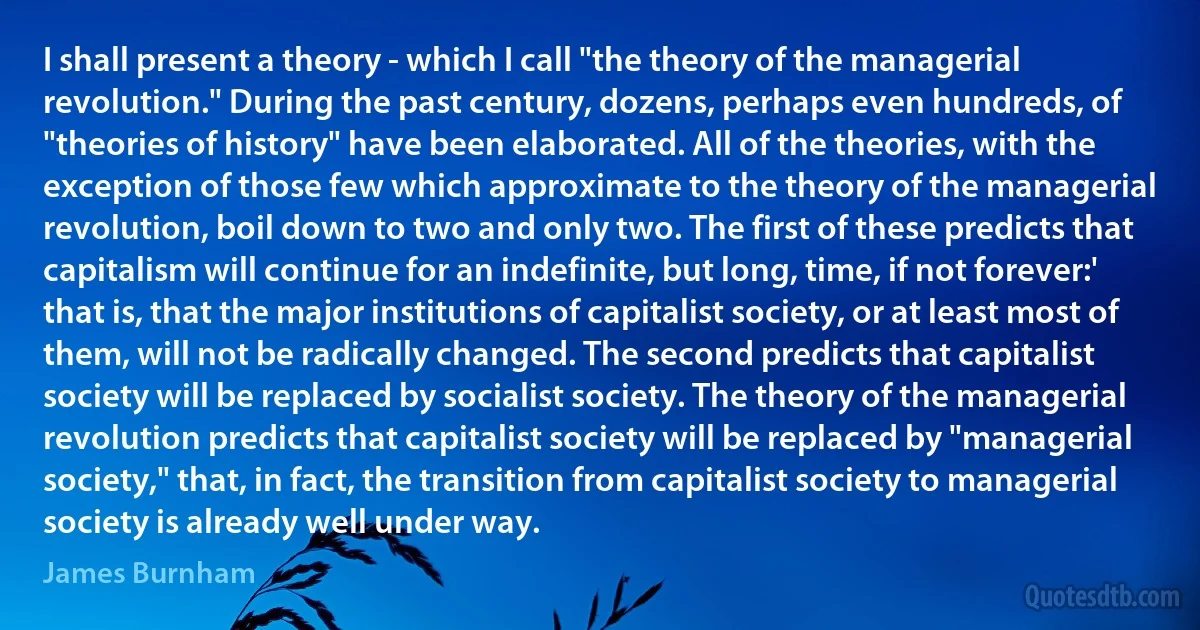
I shall present a theory - which I call "the theory of the managerial revolution." During the past century, dozens, perhaps even hundreds, of "theories of history" have been elaborated. All of the theories, with the exception of those few which approximate to the theory of the managerial revolution, boil down to two and only two. The first of these predicts that capitalism will continue for an indefinite, but long, time, if not forever:' that is, that the major institutions of capitalist society, or at least most of them, will not be radically changed. The second predicts that capitalist society will be replaced by socialist society. The theory of the managerial revolution predicts that capitalist society will be replaced by "managerial society," that, in fact, the transition from capitalist society to managerial society is already well under way.
James BurnhamRelated topics
boil call capitalist century continue exception few forever history indefinite least past perhaps present revolution second socialist time transition under way wellRelated quotes
There is a great affinity in me with the Hindu genius - that mind, vast, imaginative, loving, dreamy and speculative, but destitute of ambition, personality and will. Pantheistic disinterestedness, the effacement of the self in the great whole, womanish gentleness, a horror of slaughter, antipathy to action - these are all present in my nature, in the nature at least which has been developed by years and circumstances. Still the West has also its part in me. What I have found difficult to keep up a prejudice in favor of my form, nationality or individuality whatever. Hence my indifference to my own person, my own usefulness, interest or opinions of the moment. What does it all matter? It is not perhaps not a bad thing,' he says, 'that in the midst of the devouring activities of the Western world there should be a few Brahmanical souls.

Henri-Frédéric Amiel
THEY who are acquainted with the present state of the theory of Symbolical Algebra, are aware, that the validity of the processes of analysis does not depend upon the interpretation of the symbols which are employed, but solely upon the laws of their combination. Every system of interpretation which does not affect the truth of the relations supposed, is equally admissible, and it is thus that the same process may, under one scheme of interpretation, represent the solution of a question on the properties of numbers, under another, that of a geometrical problem, and under a third, that of a problem of dynamics or optics. This principle is indeed of fundamental importance; and it may with safety be affirmed, that the recent advances of pure analysis have been much assisted by the influence which it has exerted in directing the current of investigation.

George Boole
It is better the truth should come little by little. I have learned that, being a priest. Perhaps, in the old days, they ate knowledge too fast.
Nevertheless, we make a beginning. it is not for the metal alone we go to the Dead Places now - there are the books and the writings. They are hard to learn. And the magic tools are broken - but we can look at them and wonder. At least, we make a beginning. And, when I am chief priest we shall go beyond the great river. We shall go to the Place of the Gods - the place newyork - not one man but a company. We shall look for the images of the gods and find the god ASHING and the others - the gods Lincoln and Biltmore and Moses. But they were men who built the city, not gods or demons. They were men. I remember the dead man's face. They were men who were here before us. We must build again.

Stephen Vincent Benét
...yet we are told that this great nation, with such a record of splendid achievements in the past and in the present, is unfit to make its own laws, is unfit to control its own finance, and that it is to be placed as if it were a nation of children or lunatics, under the tutelage and guardianship of some other body-and what body? Who are the guardians of this mighty people? Who are they? With all respect, I shall have to make exceptions; but I am speaking of them as a whole. ... They are men who have neither the training, the qualifications, nor the experience which would fit them for such a gigantic task. They are men whose sole qualification-speaking in the main, and for the majority of them-they are simply men whose sole qualification is that they are the first born of persons who had just as little qualification as themselves.

David Lloyd George
There is today almost no scientific theory which was held when, say, the Industrial Revolution began about 1760. Most often today's theories flatly contradict those of 1760; many contradict those of 1900. In cosmology, in quantum mechanics, in genetics, in the social sciences, who now holds the beliefs that seemed firm sixty years ago? Yet the society of scientists has survived these changes without a revolution, and honors the men whose beliefs it no longer shares. No one has recanted abjectly at a trial before his colleagues. The whole structure of science has been changed and no one has been either disgraced or deposed. Through all the changes of science, the society of scientists is flexible and single-minded together, and evolves and rights itself. In the language of science, it is a stable society.

Jacob Bronowski
